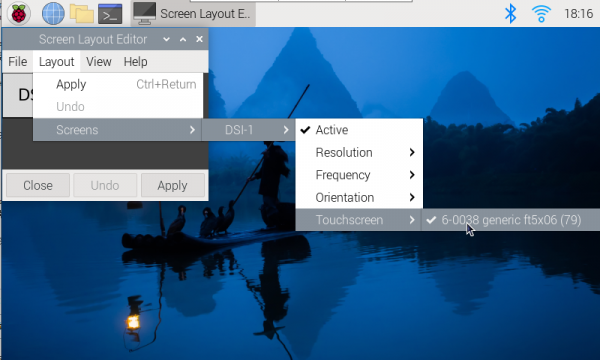3.4inch DSI LCD (C)
| ||
Feature
- 3.4-inch DSI round display with 10-point capacitive touch control.
- IPS display panel with a hardware resolution of 800×800.
- Up to 6H hardness toughened glass panel.
- Optical bonding technology for clearer imaging.
- Support Pi5/4B/CM4/3B+/3A+/3B/CM3+/CM3.
- Directly drive LCD via Raspberry Pi's DSI interface, refresh rate up to 60Hz.
- When working with Raspberry Pi, support Bookworm/Bullseye/Buster.
- Adjustable Brightness Via Software.
Hardware Connection
Working with Pi4B/3B+/3B/3A+
1. Connect the DSI connector of the display to the DSI connector on the Raspberry Pi board with a 15PIN FPC cable.
2. Install the Raspberry Pi with its back facing downwards onto the display board, and connect it to the 5V power supply and I2C communication via the 4-pin header.
The installation effect is as follows:

Working with Pi5/CM4/CM3+/CM3
1. Use the "DSI-Cable-12cm" ribbon cable to connect the LCD screen's DSI interface to the Raspberry Pi's 22PIN DSI1 interface.
2. Install the Raspberry Pi with its back facing downwards onto the display board, and connect it to the 5V power supply and I2C communication via the 4-pin header.
The installation effect is as follows:

Software Setting
For Bookworm and Bullseye System
- 1. Insert the TF card into the PC, download and use Raspberry Pi Imager to program the corresponding image.
- 2. After programming the image, open the "config.txt" file located in the root directory of the TF card. Add the following code at the end of config.txt, save the file, and safely eject the TF card.
Note: As Pi 5/CM4/CM3+/CM3 has two MIPI DSI interfaces, please ensure to use the correct DSI interface and command. DSI1 is recommended by default.
dtoverlay=vc4-kms-v3d
#DSI1 Use
dtoverlay=vc4-kms-dsi-waveshare-panel,3_4_inch
#DSI0 Use
#dtoverlay=vc4-kms-dsi-waveshare-panel,3_4_inch,dsi0
- 3. Insert the TF card into the Raspberry Pi, power on the Raspberry Pi, and wait for a few seconds. After the system boots up, you should be able to enter the display interface and the LCD should touch normally.
For Buster System
Backlight Control
WaveShare provides the corresponding demo for the application (only supports Bookworm and Bullseye systems). Users can install it by the following commands:
wget https://files.waveshare.com/upload/f/f4/Brightness.zip unzip Brightness.zip cd Brightness sudo chmod +x install.sh ./install.sh
After installation, you can open it: Menu -》Accessories -》Brightness:
In addition, you can also input the following commands to control the backlight brightness in the terminal:
echo X | sudo tee /sys/class/backlight/*/brightness
X indicates any number from 0 to 255. 0 means the backlight is the darkest, and 255 means the backlight is the brightest. For example:
echo 100 | sudo tee /sys/class/backlight/*/brightness echo 0 | sudo tee /sys/class/backlight/*/brightness echo 255 | sudo tee /sys/class/backlight/*/brightness
Bookworm Display Rotation
GUI interface rotation
- 1. Open the "Screen Configuration" application;
- 2. Go to "Screen" - > "DSI-1" - > "Touchscreen" and check "6-0038 generic ft5x06(79)"
- 3. Click "Apply" and close the current window. Restart according to the pop-up prompt, and then touch screen select Done.
- 4.Go to "Screen" -> "DSI-1" -> "Orientation", check the direction you need to rotate, and finally click "Apply" to complete the display and touch synchronous rotation.
 -->
-->
Note: Only the Bookworm system supports the above synchronization rotation method. For the Bullseye and Butser systems, manual separate settings for touch rotation are required after displaying the rotation.
lite version display rotation
- 1. Need to modify the /boot/cmdline.txt file:
sudo nano /boot/cmdline.txt
- 2. At the beginning of the cmdline.txt file, add the command for displaying the rotation angle: (Please note, this command needs to be on the same line, with each command separated by a space.)
video=DSI-1:800x480M@60,rotate=90
Change the display rotation angle by modifying the rotate value to 90, 180, or 270.
- 3. Save and restart
sudo reboot
Bullseye/Buster Display Rotation
- 1. Open "Screen Configuration" application:
- 2. Enter "Screen"->"DSI-1"->"Orientation", select the rotation direction, and then click on "Apply" to complete the display rotation.
Bullseye/Buster Touch Rotation
sudo nano /boot/config.txt #Change the command for the touch rotation angle at the end of the config.txt file, reboot it to take effect (the command for 0° touch direction exists by default) #0°: dtoverlay=WS_xinchDSI_Touch,invertedx,swappedxy #90°: dtoverlay=WS_xinchDSI_Touch,invertedx,invertedy #180°: dtoverlay=WS_xinchDSI_Touch,invertedy,swappedxy #270°: dtoverlay=WS_xinchDSI_Touch
lite Version Rotation
sudo nano /boot/cmdline.txt #Add the command to display the rotation angle at the beginning of the cmdline.txt file, save and reboot to take effect #Display rotates 90° video=DSI-1:800x800M@60,rotate=90 #Display rotates 180° video=DSI-1:800x800M@60,rotate=180 #Display rotates 270° video=DSI-1:800x800M@60,rotate=270
Sleep Mode
Run the following commands on the Raspberry Pi terminal, and the screen can enter the sleep mode:
xset dpms force off
Disable Touching
At the end of the config.txt file, add the following commands corresponding to disabling touch (the config file is located in the root directory of the TF card, and can also be accessed through the command: sudo nano /boot/config.txt):
disable_touchscreen=1
Note: After adding the command, it needs to be restarted to take effect.
FAQ
Replace the image in this directory /usr/share/plymouth/themes/pix/splash.png with the custom image.
{{{5}}}
300cd/㎡
Resource
3D Drawing
Project Resources
This section features third - party project resources. We merely provide links and bear no responsibility for content updates or maintenance. Thank you for your understanding.
VEEB Projects- a Transparent Computer Using a 150-Year-Old Illusion!
Support
Technical Support
If you need technical support or have any feedback/review, please click the Submit Now button to submit a ticket, Our support team will check and reply to you within 1 to 2 working days. Please be patient as we make every effort to help you to resolve the issue.
Working Time: 9 AM - 6 PM GMT+8 (Monday to Friday)








